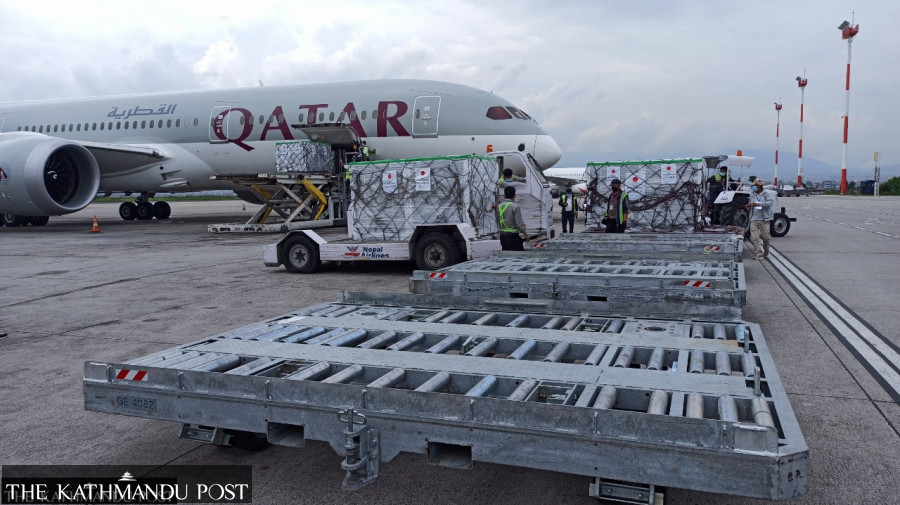Health
Final consignment of 1.6 million AstraZeneca doses arrives from Japan
A total of 559,360 shots were delivered on Monday. On August 7, 8 and 21, Nepal had received 513,420,333,900 and 208,060 doses.
Arjun Poudel
Nepal on Monday received 559, 360 doses of AstraZeneca vaccine from Japan.
This is the last batch of the total 1.6 million doses the government of Japan had pledged to Nepal through COVAX, a United Nations-backed international vaccine-sharing scheme.
“We have received the final consignment of vaccines from Japan today,” Upendra Dhungana, chief of the Logistic Management Division under the Department of Health Services, told the Post.
Earlier this month, a total of 1,055,380 doses of AstraZeneca vaccine manufactured in Japan were provided. On August 7 and 8, Nepal received 513,420 doses and 333,900 doses. Then on August 21, as many as 208,060 doses were supplied to Nepal.
The government of Japan in July had announced that it would provide 1,614,740 doses of AstraZeneca vaccine through COVAX.
Officials at the Health Ministry said that these doses will be used to give second doses to those who had taken their first doses of Covishield, the AstraZeneca type of vaccine manufactured by the Serum Institute of India, in the second week of March.
Around 1.4 million people aged 65 and above, who had taken first doses of Covishield between March 7 and 15, were deprived of their second doses as Nepal had failed to secure additional doses of AstraZeneca vaccine.
After Bhutan supplied 230,000 doses and Japan supplied the first consignment of AstraZeneca vaccine, the government started giving second doses to those who took their first doses in March from August 9.
The Health Ministry had started inoculating people from other groups in Kathmandu after all those who had received first doses of AstraZeneca did not seek second doses.
College students, who have taken exam admit cards, employees and labourers working in the construction of the new parliament building, migrant workers and students and others who are going abroad, patients with renal conditions who have to undergo dialysis, those having organ transplantation and cancer patients are on the priority list for the first dose of AstraZeneca vaccine.
Those residing in rehabs and the staff serving there, workers serving in industrial areas, women and girls sheltering at Maiti Nepal, family members of security personnel and those above 30 are also on the priority list for AstraZeneca vaccine.
Nepal so far has used AstraZeneca vaccine (manufactured in India, Japan, and Europe), Vero Cell, developed by China’s Sinopharm, and Janssen by Johnson and Johnson of the United States of America to inoculate its population against the coronavirus.
So far, the country has received 13,227,590 doses of vaccine.
Of them, 7.4 million doses of Vero Cell (5.6 million doses bought and 1.8 million doses provided under grants) have arrived in Nepal.
The United States of America in July provided 1,534,850 doses of single-shot Johnson and Johnson vaccin through the COVAX facility
Apart from this, COVAX itself had supplied 348,000 doses of Covishield in the first week of March.
India has provided 1.1 million Covishield vaccine under grant assistance and Nepal had purchased 1 million doses from the Serum Institute of India.
Bhutan provided 230,000 doses of AstraZeneca vaccine.
Meanwhile, the Health Ministry said that additional doses of Vero Cell vaccine will be delivered in coming days from China. Of the 6 million doses of Vero Cell purchases by the government, only 1.6 million doses have been delivered. China has also pledged to provide an additional 1.6 million doses of Vero Cell under grant assistance.
The Health Ministry has said that it is working to manage funds to purchase an additional 6 million doses of Vero Cell from China.
The government has already paid for four million doses of the Moderna vaccine through the World Bank to the US manufacturer of the vaccine, and delivery is expected by mid-February.
Also expected by mid-February is the delivery of 11 million doses from COVAX under a cost-sharing mechanism, which means the government will pay the vaccine-sharing scheme the amount equivalent to what the facility paid to the manufacturing company.
As of Sunday, 4,942,250 people (16.47 percent) have taken their first dose of vaccine and 3,846,736 people( 12.82 percent) have been fully immunised.




 16.12°C Kathmandu
16.12°C Kathmandu















